
Introduction:
Gambling addiction is a significant issue affecting individuals worldwide. It can lead to financial, emotional, and social problems. If you or someone you know is struggling with gambling addiction, it's essential to understand the importance of seeking help and adopting effective strategies for recovery. In this article, we will explore various methods to heal gambling addiction and provide you with valuable insights on overcoming this challenging problem.
1. Understanding the Nature of Gambling Addiction
Gambling addiction is characterized by an uncontrollable urge to gamble, despite negative consequences. It is a behavioral addiction, which means it involves a pattern of repeated, compulsive behaviors. Understanding the underlying causes and triggers can help individuals take the first step towards recovery.
1.1 Genetic Factors:
Research suggests that genetics play a role in gambling addiction. Individuals with a family history of addiction may be more susceptible to developing a gambling problem.
1.2 Environmental Influences:
Exposure to gambling opportunities, such as casinos, online platforms, and advertisements, can increase the risk of developing a gambling addiction.
1.3 Psychological Factors:
People with certain personality traits, such as impulsivity and thrill-seeking, may be more prone to developing a gambling addiction.
2. Identifying the Signs and Symptoms
Recognizing the signs and symptoms of gambling addiction is crucial for seeking help and initiating the healing process. Here are some common indicators:
2.1 Increased Time Spent on Gambling:
Spending excessive time and energy on gambling activities, neglecting responsibilities, and prioritizing gambling over other important aspects of life.
2.2 Financial Consequences:
Borrowing money, selling belongings, or engaging in illegal activities to support gambling habits, leading to financial ruin.
2.3 Emotional and Psychological Distress:
Experiencing feelings of guilt, shame, and anxiety due to gambling, as well as struggling with depression and other mental health issues.
2.4 Relationship Struggles:
Gambling addiction can strain relationships with family, friends, and partners, leading to conflicts and isolation.
3. Seeking Professional Help
Professional treatment is essential for healing gambling addiction. Here are some options to consider:
3.1 Therapy:
Cognitive-behavioral therapy (CBT) and other forms of therapy can help individuals develop healthier coping mechanisms, challenge gambling-related beliefs, and address underlying issues.
3.2 Support Groups:
Joining support groups, such as Gamblers Anonymous, can provide a sense of community, shared experiences, and practical advice for recovery.
3.3 Residential Treatment Programs:
For severe cases, residential treatment programs offer a structured environment with round-the-clock support and therapy.
4. Building a Support Network
A strong support network is vital for overcoming gambling addiction. Here are some ways to build a supportive community:
4.1 Family and Friends:
Openly communicate with loved ones about your struggles and seek their understanding and support. Encourage them to attend family therapy sessions if needed.
4.2 Support Groups:
Participating in support groups, such as Gam-Anon, can help you connect with others who understand the challenges of gambling addiction.
4.3 Mental Health Professionals:
Building a relationship with a therapist or counselor who specializes in gambling addiction can provide ongoing support and guidance.
5. Implementing Effective Strategies
Adopting effective strategies can help individuals overcome gambling addiction and maintain long-term recovery. Here are some key strategies:
5.1 Financial Management:
Develop a budget, seek financial counseling, and avoid credit cards or loans that may encourage gambling.
5.2 Time Management:
Set specific time limits for gambling activities and establish boundaries to prevent excessive time spent on gambling.
5.3 Coping Skills:
Learn healthy coping mechanisms, such as exercise, hobbies, or mindfulness practices, to deal with cravings and stress.
5.4 Relapse Prevention:
Identify potential triggers and develop a plan to avoid or cope with them effectively.
5.5 Self-Reflection:
Regularly reflect on your progress and setbacks, acknowledging your strengths and seeking opportunities for growth.
Frequently Asked Questions:
1. Q: Can gambling addiction be cured?
A: While there is no permanent cure for gambling addiction, recovery is possible with the right support, treatment, and commitment.
2. Q: How long does it take to recover from gambling addiction?
A: The duration of recovery varies for each individual. Some may experience immediate improvements, while others may require long-term treatment and support.
3. Q: Can medication help treat gambling addiction?
A: Medication is not typically used to treat gambling addiction directly. However, it may be prescribed to address co-occurring mental health issues, such as depression or anxiety.
4. Q: Is it possible to gamble responsibly?
A: For individuals with a gambling addiction, gambling responsibly is challenging. It's crucial to seek professional help and support to overcome addiction.
5. Q: Can gambling addiction affect other areas of life?
A: Yes, gambling addiction can have a significant impact on various aspects of life, including financial stability, relationships, and mental health. Seeking help is essential to address these consequences and regain control over your life.